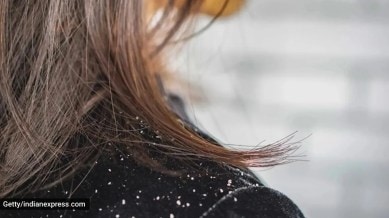📣 For more lifestyle news, click here to join our WhatsApp Channel and also follow us on Instagram
Anxiety, stress and its unlikely companion: Aggravated dandruff and scalp conditions
Apart from excess sebum production and flaky scalp, mental health is also a leading factor for scalp health

Written by Navya Pathak
Anxiety and stress, common mental health issues affecting millions worldwide, are linked to various physical symptoms like headaches, digestive issues, and sleep disturbances. An often overlooked consequence is their impact on the scalp. “Seborrheic dermatitis, or dandruff, is a chronic condition with flaky, itchy, and sometimes inflamed skin on the scalp caused by the organism Pityrosporum Ovale. Mood disorders are often associated with severe dandruff,” says Dr Renu Jadhav, dermatologist at Resolute Care Clinic.
monthly limit of free stories.
with an Express account.
The stress-scalp connection
“Anxiety and stress can trigger dandruff as they are interlinked neurological disorders,” says Dr Rashmi Aderao, a dermatologist.
Stress and anxiety trigger a lot of hormonal changes in the body. Rucha Divekar, a consultant psychologist at the Ruby Hall Clinic said, “This is due to cortisol, the primary stress hormone. Increased cortisol levels can disrupt the natural balance of various bodily systems, including the skin. The scalp is like any other part of the skin.”
A challenging aspect of this relationship is the vicious cycle it creates: anxiety worsens dandruff, which in turn increases stress. Aderao said, “Many patients with scalp conditions are unaware they might also have anxiety and stress. We treat their conditions and refer them to psychologists.”
Psychological and physiological mechanisms
The link between anxiety and dandruff is both psychological and physiological. “Mental health and physical health are two sides of the same coin. How you feel mentally is how you will feel physically. If cortisol is not managed properly, these skin conditions can aggravate OCD and psoriasis,” said Divekar.
Physiologically, the body’s inflammatory response plays a crucial role. Jadhav said, “This condition often starts at puberty and peaks between ages 20-30 due to high stress levels. Overheating and sweating, associated with anxiety and stress, provide an ideal environment for dandruff and scalp infections.”
Solutions
The link between anxiety, stress, and scalp conditions is a complex interplay between mental and physical health. Recognising this connection can help individuals manage both their anxiety and scalp conditions effectively. “We have an approach called psycho-dermatology, where we address the intersection between the mind and the skin,” said Divekar.
Jadhav recommended, “Switching between gentle shampoos and medicated shampoos thrice a week with ingredients such as 2 per cent ketoconazole, zinc pyrithione, and selenium sulfide will suffice. In case of severe dandruff, please consult a dermatologist.”
She also said, “Eating a healthy diet, managing stress, developing a proper scalp routine, getting more sun exposure, limiting hair styling products, and avoiding oil application on the scalp can also help.”
📣 For more lifestyle news, click here to join our WhatsApp Channel and also follow us on Instagram